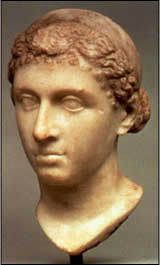
On August 30, 30 B.C. Cleopatra VII Queen of Egypt . Took her own Life following her defeat by Octavian.
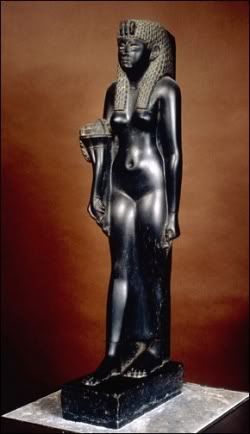
Cleopatra VII Philopator (in Greek, Κλεοπάτρα Φιλοπάτωρ; January 69 BC – 30 BC) was an Hellenistic ruler of Egypt, originally sharing power with her father Ptolemy XII and later with her brothers/husbands Ptolemy XIII and Ptolemy XIV; eventually gaining sole rule of Egypt. As Pharaoh, she consummated a liaison with Gaius Julius Caesar that solidified her grip on the throne. After Caesar's assassination, she aligned with Mark Antony, with whom she produced a pair of twins and a son. In all, Cleopatra had four children, a first born son by Caesar (Ptolemy Caesar nicknamed Caesarion) and three by Mark Antony (the pair of twins, Cleopatra Selene II & Alexander Helios, and last a son Ptolemy Philadelphus). Her successive unions with her brothers produced no children. It is quite certain that they were never consummated; in any case, they were not close or rarely ever anywhere closer than polite terms. Her reign marks the end of the Hellenistic Era and the beginning of the Roman Era in the eastern Mediterranean. She was the last Pharaoh of Ancient Egypt. Her son by Julius Caesar, Caesarion, co-ruled in name with his mother only a very few years before Octavian, later on renamed Caesar Augustus, had him executed. Most probably by strangulation, which in Antiquity was the execution method reserved for infants & pre pubescent, thus adding humiliation to his execution.
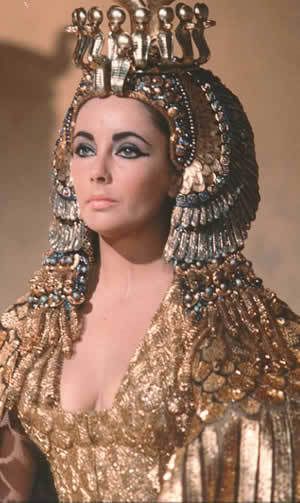
Though she bore the ancient Egyptian title Pharaoh, her primary language was Greek; for several centuries preceding her rule, Egyptian kings had been of Macedonian (i.e.Hellenistic) origin rather than Egyptian origin. The establishment of a Greek-speaking aristocracy in Egypt had come with Alexander the Great nearly 300 years before. Cleopatra is reputed to have been the first member of her family in their 300-year reign in Egypt to have learned the Egyptian language. Cleopatra adopted common Egyptian beliefs and deities. Her patron goddess was Isis, and thus during her reign, it was believed that she was the re-incarnation and embodiment of the goddess of wisdom.
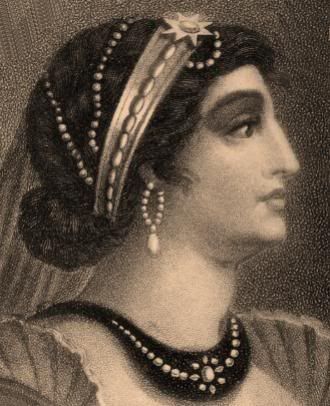
After Antony and Cleopatra were defeated at Actium by their rival and Caesar's legal heir, Gaius Julius Caesar Octavian (who later became the first Roman Emperor, Augustus), Cleopatra committed suicide, the traditional date being 12 August 30 BC,allegedly by means of an asp bite. To this day she remains popular in Western culture. Her legacy survives in numerous works of art and the many dramatizations of her story in literature, (e.g. Shakespeare's Antony and Cleopatra and George Bernard Shaw's Caesar & Cleopatra) film, and television. (e.g. Elizabeth Taylor's depiction in Cleopatra, and the BBC/HBO co-production Rome)
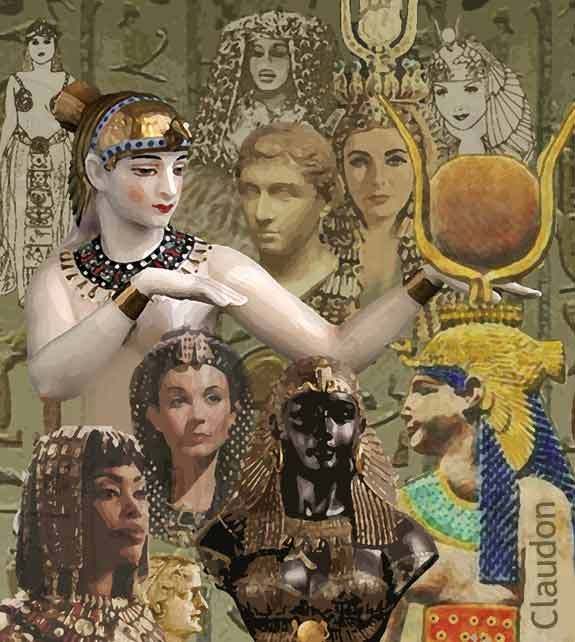
In most depictions, Cleopatra is put forward as a great beauty and her successive conquests of the world's most powerful men is taken to be proof of her aesthetic and sexual appeal. In his Pensées, philosopher Blaise Pascal contends that Cleopatra's classically beautiful profile changed world history: "Cleopatra's nose, had it been shorter, the whole face of the world would have been changed."
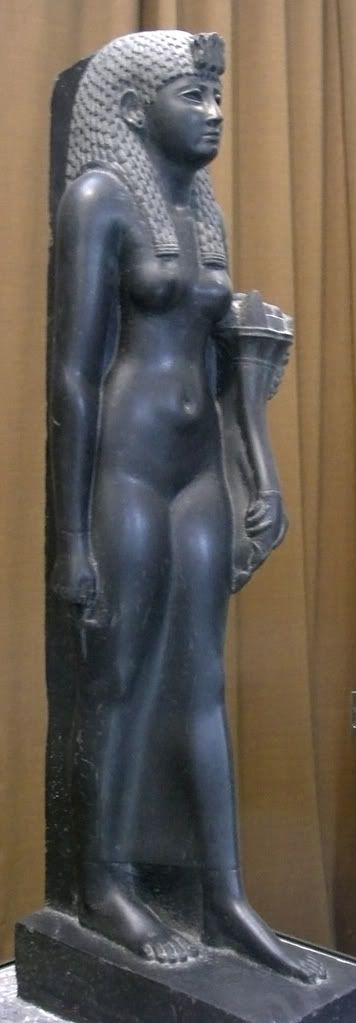
Cleopatra's mother was Cleopatra V of Egypt and Cleopatra, who was borne of her union with Ptolemy XII Auletes, was a direct descendant of Alexander the Great's general, Ptolemy I Soter, son of Arsinoe and Lacus, both of Macedon.
Centralization of power and corruption led to uprising in and loss of Cyprus and of Cyrenaica, making Ptolemy's reign one of the most calamitous of the dynasty. When Ptolemy made a journey to Rome with Cleopatra, Cleopatra VI Tryphaena took the crown, but died shortly afterwards under suspicious circumstances. Some believe Berenice IV poisoned her so she could rule Egypt. She did until Auletes returned and had her executed.
Ptolemy XII died in March 51 BC, making the 18-year-old Cleopatra and her brother, the 12-year-old Ptolemy XIII joint monarchs. The first three years of their reign were difficult, due to economic difficulties, famine, deficient floods of the Nile, and political conflicts. Although Cleopatra was married to her young brother, she quickly showed indications that she had no intentions of sharing power with him.
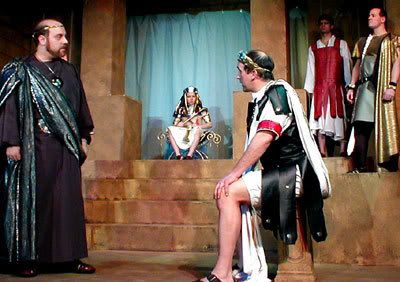
In August 51 BC, relations between the sovereigns completely broke down. Cleopatra dropped Ptolemy's name from official documents and her face appeared alone on coins, which went against Ptolemaic tradition of female rulers being subordinate to male co-rulers. This resulted in a cabal of courtiers, led by the eunuch Pothinus, removing Cleopatra from power and making Ptolemy sole ruler in circa 48 BC (or possibly earlier, as a decree exists from 51 BC with Ptolemy's name alone). She tried to raise a rebellion around Pelusium, but she was soon forced to flee Egypt with her only surviving sister, Arsinoë.
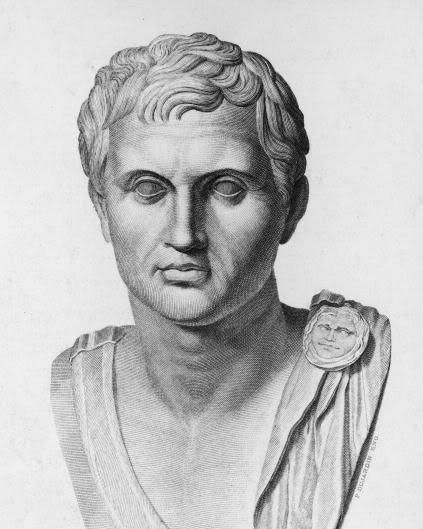
While Cleopatra was in exile, Pompey became embroiled in the Roman civil war. In the autumn of 48 BC, Pompey fled from the forces of Julius Caesar to Alexandria, seeking sanctuary. Ptolemy, only fifteen years old at that time, had set up a throne for himself on the harbour from where he watched as on September 28 48 BC Pompey was murdered by one of his former officers, now in Ptolemaic service. He was beheaded in front of his wife and children, who were on the ship from which he had just disembarked. Ptolemy is thought to have ordered the death as a way of pleasing Julius Caesar and thus become an ally of Rome, to which Egypt was in debt. This was a catastrophic miscalculation on Ptolemy's part. When Caesar arrived in Egypt two days later, Ptolemy presented him with Pompey's severed head. Caesar was enraged. Although he was Caesar's political enemy, Pompey was a Consul of Rome and the widower of Caesar's only legitimate daughter, Julia (who died in childbirth with their son). Caesar seized the Egyptian capital and imposed himself as arbiter between the rival claims of Ptolemy and Cleopatra.

Eager to take advantage of Julius Caesar's anger with Ptolemy, Queen Cleopatra returned to the palace rolled into a Persian carpet and had it presented to Caesar by her servants: when it was unrolled, Cleopatra tumbled out. It is believed that Caesar was charmed by the gesture, and she became his mistress. Nine months after their first meeting, Cleopatra gave birth to their baby. It was at this point that Caesar abandoned his plans to annex Egypt, instead backing Cleopatra's claim to the throne. After a short civil war, Ptolemy XIII was drowned in the Nile and Caesar restored Cleopatra to her throne, with another younger brother Ptolemy XIV as new co-ruler.
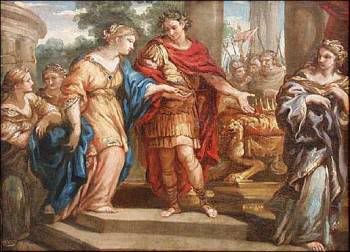
Despite a more than thirty year age difference, Cleopatra and Caesar became lovers during his stay in Egypt between 48 BC and 47 BC. They met when they were 21 (Cleopatra) and 52 (Caesar). On 23 June 47 BC Cleopatra gave birth to a child, Ptolemy Caesar (nicknamed "Caesarion" which means "little Caesar"). Cleopatra claimed Caesar was the father and wished him to name the boy his heir, but Caesar refused, choosing his grand-nephew Octavian instead. Caesarion was the intended inheritor of Egypt and Rome, uniting the East and the West.
Cleopatra and Caesarion visited Rome between 47 BC and 44 BC and may have been present when Caesar was assassinated on 15 March, 44 BC. Before or just after the assassination she returned to Egypt. When Ptolemy XIV died due to deteriorating health, Cleopatra made Caesarion her co-regent and successor. To safeguard herself and Caesarion she also had her sister Arsinoe killed, a common practice of the times.
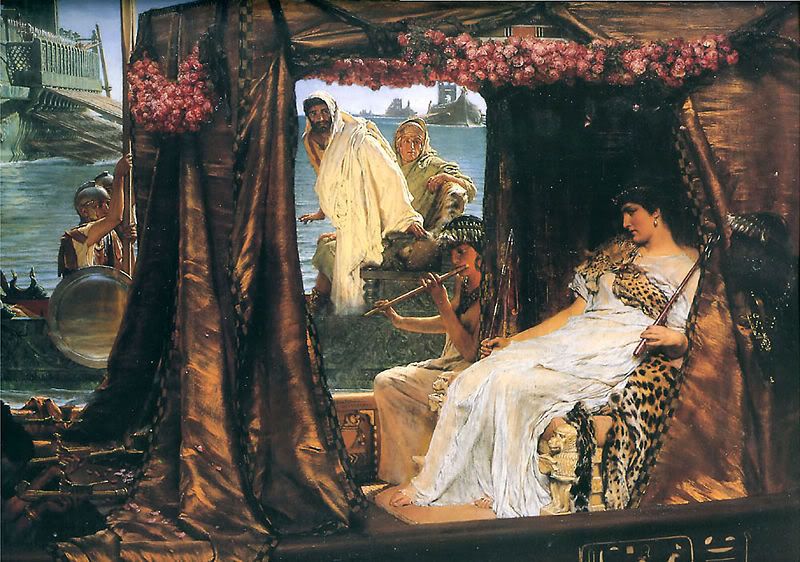
In 42 BC, Mark Antony, one of the triumvirs who ruled Rome in the power vacuum following Caesar's death, summoned Cleopatra to meet him in Tarsus to answer questions about her loyalty. Cleopatra arrived in great state, and so charmed Antony that he chose to spend the winter of 41 BC–40 BC with her in Alexandria. On 25 December 40 BC she gave birth to two children Alexander Helios and Cleopatra Selene II.
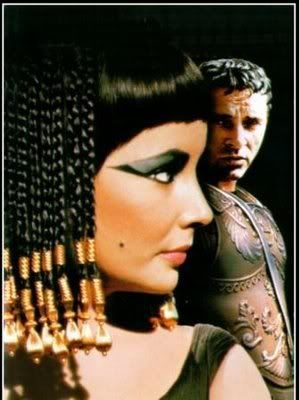
Four years later in 37 BC, Antony visited Alexandria again en route to make war with the Parthians. He renewed his relationship with Cleopatra, and from this point on Alexandria would be his home. He married Cleopatra according to the Egyptian rite (a letter quoted in Suetonius suggests this), although he was at the time married to Octavia Minor, sister of his fellow triumvir Octavian. He and Cleopatra had another child, Ptolemy Philadelphus.
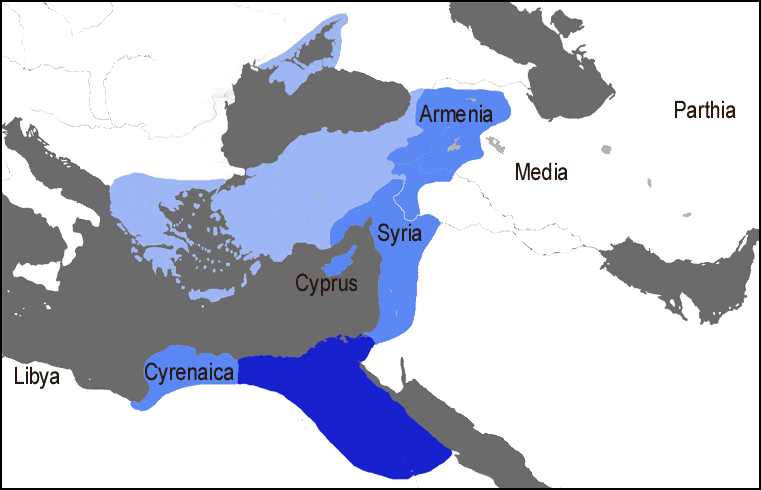
At the Donations of Alexandria in late 34 BC, following Antony's conquest of Armenia, Cleopatra and Caesarion were crowned co-rulers of Egypt and Cyprus; Alexander Helios was crowned ruler of Armenia, Media, and Parthia; Cleopatra Selene II was crowned ruler of Cyrenaica and Libya; and Ptolemy Philadelphus was crowned ruler of Phoenicia, Syria, and Cilicia. Cleopatra also took the title of Queen of Kings. Cleopatra "was planning a war of revenge that was to array all the East against Rome, establish herself as empress of the world at Rome and inaugurate a new universal kingdom."
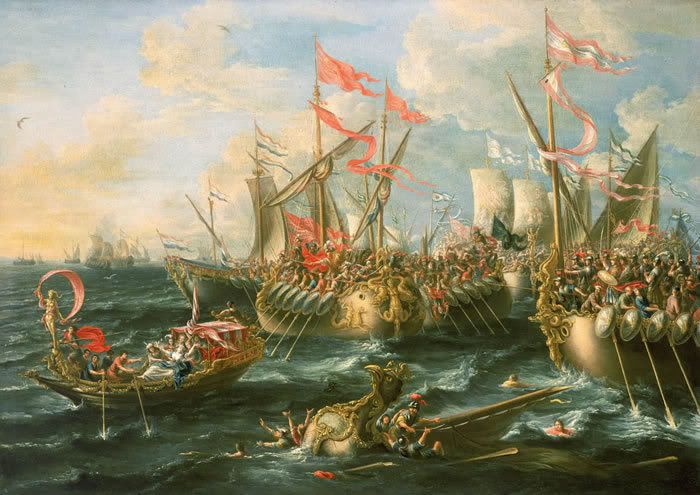
Antony's behavior was considered outrageous by the Romans, and Octavian convinced the Senate to levy war against Egypt. In 31 BC Antony's forces faced the Romans in a naval action off the coast of Actium. Cleopatra was present with a fleet of her own. Popular legend states that when she saw that Antony's poorly equipped and manned ships were losing to the Romans' superior vessels, she took flight and that Antony abandoned the battle to follow her, but no contemporary evidence states this was the case.
There are a number of unverifiable stories about Cleopatra, of which one of the best known is that, at one of the lavish dinners she shared with Antony, she playfully bet him that she could spend ten million sesterces on a dinner. He accepted the bet. The next night, she had a conventional, unspectacular meal served; he was ridiculing this, when she ordered the second course — only a cup of strong vinegar. She then removed one of her priceless pearl earrings, dropped it into the vinegar, allowed it to dissolve, and drank the mixture. The earliest report of this story comes from Pliny the Elder and dates to about 100 years after the banquet described would have happened. The calcium carbonate in pearls does dissolve in vinegar, but slowly unless the pearl is first crushed.
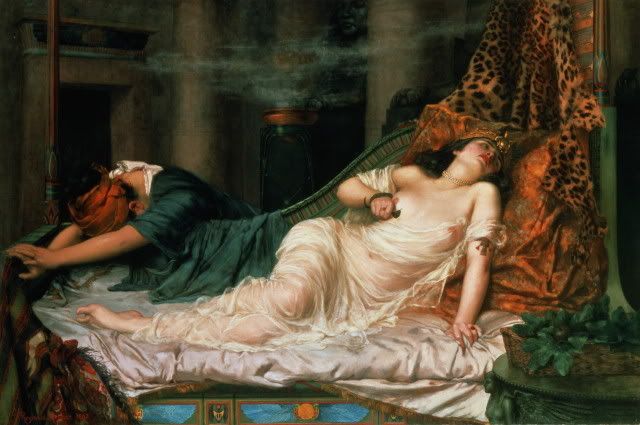
The ancient sources, particularly the Roman ones, are in general agreement that Cleopatra poisoned herself by inducing an asp to bite her. The oldest source is Strabo, who was alive at the time of the event, and might even have been in Alexandria. He says that there are two stories: that she applied a toxic ointment, or that she was bitten by an asp.Several Roman poets, writing within ten years of the event, all mention bites by two asps, as does Florus, a historian, some 150 years later. Velleius, sixty years after the event, also refers to an asp.
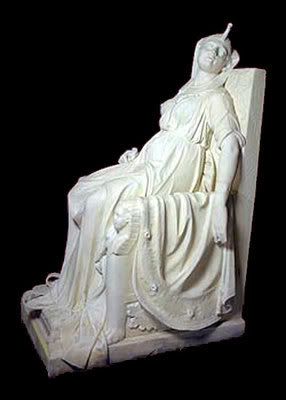
Plutarch, writing about 130 years after the event, provides the main source of Cleopatra's death. He states that she was found dead, her handmaiden Iras dying at her feet, and another handmaiden, Charmion, adjusting her crown before she herself falls. He then goes on to state that an asp was concealed in a basket of figs that was brought to her by a rustic, and finding it after eating a few figs, she holds out her arm for it to bite. Others stories state that it was hidden in a vase, and that she poked it with a spindle until it got angry enough to bite her on the arm. Finally, he eventually writes, in Octavian's triumphal march back in Rome, an effigy of Cleopatra that has an asp clinging to it is part of the parade.

Suetonius, writing about the same time as Plutarch, also says Cleopatra died from an asp bite.
Shakespeare gave us the final part of the image that has come down to us, Cleopatra clutching the snake to her breast.Before him, it was generally agreed that she was bitten on the arm.
Plutarch tells us of the death of Antony. When his armies desert him and join with Octavian, he cries out that Cleopatra has betrayed him. She, fearing his wrath, locks herself in her monument with only her two handmaidens and sends messengers to Antony that she is dead. Believing them, Antony stabs himself in the belly with his sword, and lies on his couch to die. Instead, the blood flow stops, and he begs any and all to finish him off.
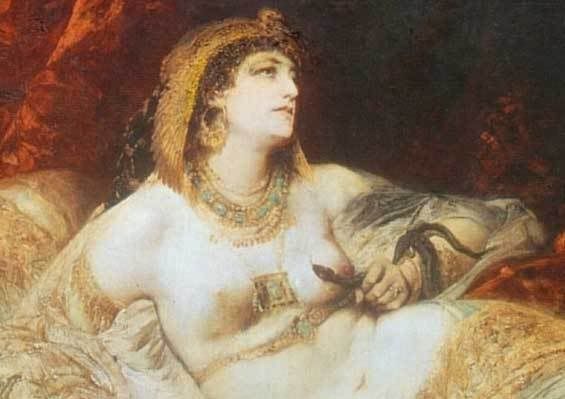
Another messenger comes from Cleopatra with instructions to bear him to her, and he, rejoicing that Cleopatra is still alive, consents. She won't open the door, but tosses ropes out of a window. After Antony is securely trussed up, she and her handmaidens haul him up into the monument. This nearly finishes him off. After dragging him in through the window, they lay him on a couch. Cleopatra tears off her clothes and covers him with them. She raves and cries, beats her breasts and engages in self-mutilation. Antony tells her to calm down, asks for a glass of wine, and dies upon finishing it.
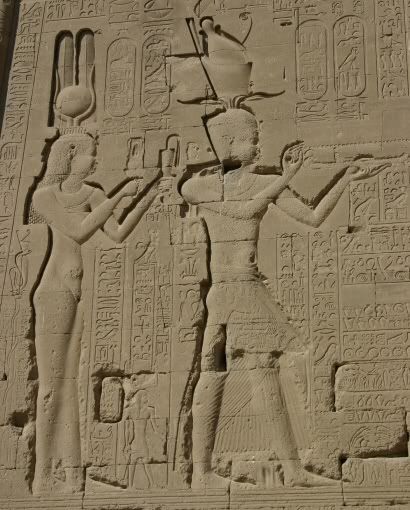
Cleopatra's son by Caesar, Caesarion, was proclaimed pharaoh by the Egyptians, but Octavian had already won. Caesarion was captured and executed, his fate reportedly sealed by Octavian's phrase: "Two Caesars are one too many." This ended not just the Hellenistic line of Egyptian pharaohs, but the line of all Egyptian pharaohs. The three children of Cleopatra and Antony were spared and taken back to Rome where they were taken care of by Antony's wife, Octavia Minor. The daughter, Cleopatra Selene, was married by arrangements by Octavian to Juba II of Mauretania.
No comments:
Post a Comment